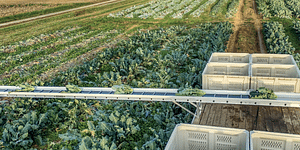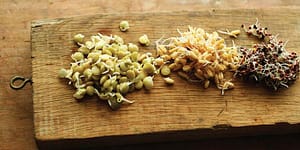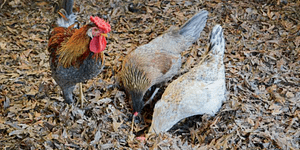The Scoop on Spoon Carving

There’s no better time than the present to pick up a new hobby! And with the new year just starting, sticking to a new hobby can be an easy and achievable resolution. One possible new hobby you could try out? Spoon carving.
The following is an excerpt from Carving Out a Living on the Land by Emmet Van Driesche. It has been adapted for the web.
(Spoon Carving. Photo by Meghan Hoagland.)
Another new skill I developed on the farm has given me options on a far greater scale, eventually becoming the biggest part of my professional identity, what I do with most of my time, and what I am known for around the world.
I am talking, oddly enough, about spoon carving. Spoon carving is one of those strange activities that seems so niche that you couldn’t possibly make any money doing it.
On the face of it, that would be correct. However, by leveraging my life and journey through Instagram I have been able to build a business that currently accounts for a quarter of my yearly income, separate from the farm revenue. By next year it will exceed revenue from the farm. Spoon carving allows me to add value to the deciduous trees on the farm, turning them into a resource that I can sustainably harvest indefinitely.
I started carving wooden spatulas during the fall when my daughter was a year and a half old. It was something I could do while keeping a watchful eye on her as she toddled around the yard. I scoured the winter firewood stacked on our porch for straight-grained pieces, split them open, and carved something quickly.
My designs were simple because they had to be. I never knew how much time I had before I needed to change a diaper or tend to a banged-up knee. The wood was dry and hard, my knife was not the greatest, and I leaned heavily on sandpaper to cover up my lack of skill.
The spatulas sold, however, first at the fall festival in town and later at the grove during the tree season. I sold them for $10 each, not a great hourly rate but not awful either, and the money reinforced my desire to do something concretely productive during the mornings or afternoons I had with her.
I didn’t carve the entire time, but if I made just one thing I could point to and tell myself I had contributed something concrete to the day, something creative, it alleviated some of the exhaustion that comes from being the parent of very young children.
When I look back at those spatulas now I cringe because I knew so little about carving, but I also feel pride, because I recognize that I treated carving like part of the farm business right from the start. Over the years, my skill as a carver has increased dramatically, but that same attitude prevails, as does the desire to make objects that are both functional and beautiful.
Recommended Reads
Recent Articles
Oxeye daisies are one of the most important plants for pollinators including beetles, ants, and moths that use oxeye daisies as a source of pollen and nectar. Instead of thinking about removing a plant like oxeye daisy, consider how you can improve the fertility and diversity of habitat resources in your home landscape, garden, or…
Read MoreSo you want to start reaping your harvest, but you’re not sure where to start? Learn how to break down the options of harvesting tools!
Read MoreWhat’s so great about oyster mushrooms? First, you can add them to the list of foods that can be grown indoors! They are tasty, easy to grow, multiply fast, and they love a variety of substrates, making oyster mushrooms the premium choice. The following is an excerpt from Fresh Food from Small Spaces by R. J.…
Read MoreEver heard the phrase, “always follow your nose?” As it turns out, this is a good rule of thumb when it comes to chicken manure. Composting chicken manure in deep litter helps build better chicken health, reduce labor, and retain most of the nutrients for your garden. The following is an excerpt from The Small-Scale Poultry…
Read More








